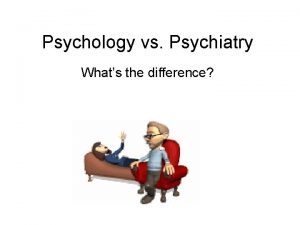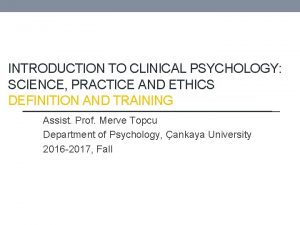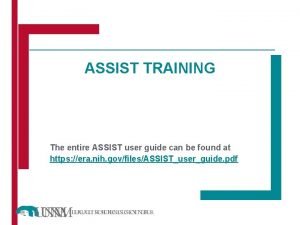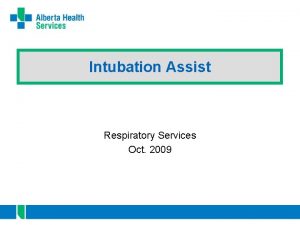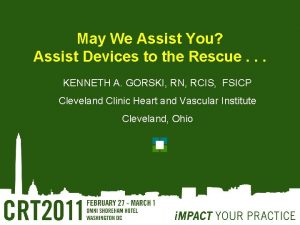Clinical Psychology An Introduction Assist Prof Dr Orkun




















































- Slides: 52

Clinical Psychology: An Introduction Assist. Prof. Dr. Orkun Aydın Head of Department Program Coordinator Office: B. F. 2. 23 Office phone: 305 (Internal) E-mail: oaydin@ius. edu. ba Instagram: orkunaydinmd

WHAT IS CLINICAL PSYCHOLOGY? • What is a clinical psychologist? • The general public remains rather confused about what psychologists do as well as their educational backgrounds. • Perhaps this should not be too surprising given that clinical psychologists are a heterogeneous group with respect to age, gender, theoretical allegiance, and roles.


Equally confusing, there are many titles that people use to indicate that they practice therapy (psychotherapist, psychoanalyst) or conduct research related to psychology ( professor, clinical scientist). • However, not all of these titles indicate that someone is a clinical psychologist. • Indeed, the American Psychological Association reserve the title “clinical psychologist” for a very select group of professionals with specific training and qualifications.

• After all these years, people still confuse clinical psychologists with medical doctors/psychiatrists. • Some continue to believe that clinical psychology is synonymous with psychoanalysis.

• Fortunately, there are many who accurately regard clinical psychologists as researchers, members of prestigious Professional societies, and providers of important human services.

The definition from APA • • The field of Clinical Psychology integrates science, theory, and practice to understand, predict, and alleviate maladjustment, disability, and discomfort as well as to promote human adaptation, adjustment, and personal development.

• Clinical Psychology focuses on the intellectual, emotional, biological, psychological, social, and behavioral aspects of human functioning across the life span, in varying cultures, and at all socioeconomic levels.

Specifications • Clinical psychologists work with a range of individuals, from infants to the elderly. • Their work can involve individuals themselves, families/partners, school personnel, other health care workers, and communities. • Clinical psychologists often work in a large range of settings, including universities, hospitals, private practice offices, or group medical practices.

Ph. D? ? • Of all of the possible mental health degrees and fields available, some have described the doctoral (Ph. D. ) degree in clinical psychology to be the most versatile, since it can lead to a very wide range of possible job opportunities. • Now we know what clinical psychologists aim to do and, by implication, the skills they possess, now it is time to notice how others see the profession.

CLOSELY RELATED MENTAL HEALTH PROFESSIONS • 1) Psychiatrists • 2) Counseling Psychologists • 3) Clinical Social Workers • 4) School Psychologists • 5) Health and Rehabilitation Psychologists • 6) Psychiatric Nurses • 7)Others (therapeutic personnel, including occupational therapists, recreational therapists, art therapists, and so on)

Psychiatrists • A psychiatrist is a physician. • They have medical profession even though their intellectual heritage comes from the non-medical contributions of Freud, Jung, Adler, and others. • much of the profession’s argument has been based on its medical background.

Psychiatrists • Psychiatrists, like all medical doctors, complete a general medical school curriculum early in their training. • They may prescribe medication, treat physical ailments, and give physical examinations. • Psychiatrists make extensive use of a variety of medications in treating their patients’ psychological difficulties.


Official definition • A psychiatrist is a medical physician who specializes in the diagnosis, treatment, and prevention of mental illnesses, including substance use disorders. • Psychiatrists are qualified to assess both the mental and physical aspects of psychological disturbance. • A psychiatrist has completed medical school (is an M. D. ) and an additional four or more years of residency training in psychiatry(6+4 years at least)

Clinical psychologists… • In contrast to psychiatrists, clinical psychologists typically receive little training in medicine. • However, clinical psychologists do receive more extensive training in A)the psychological principles B)governing human behavior, C)assessment of psychological functioning, D)Scientific research methods.

Clinical psychologists… • As compared to psychiatrists, clinical psychologists also receive more extensive training in psychotherapy • and are more likely to view psychopathology as a consequence of interactions between individuals’ biological/psychological/social predispositions and their experiences within the environment.

Psychiatrist or Psychologist?

Differences… • Consequently, many psychiatrists do not conduct extensive psychotherapy with their patients, but rather often schedule brief (i. e. , quarter-hour) “medication management” appointments with each patient. • Opportunities to work in depth with individuals experiencing psychological symptoms or to help teach behavioral skills that may reduce and prevent symptoms are more limited in psychiatry than in clinical psychology.

A major battleground for the profession of psychiatry is: prescription? ? • Currently, two states (New Mexico and Louisiana) allow “appropriately” trained psychologists to prescribe medications for treatment of certain mental health conditions (Mc. Grath, 2010). • This development has important implications for research, training, and practice. • For example, major changes in graduate training would be required to prepare clinical psychologists for this new role. (1 Year extension/increased tuition fee)

Counseling Psychologists • The activities of counseling psychologists overlap with those of clinical psychologist. • Traditionally, counseling psychologists work with normal or moderately maladjusted individuals. • Their work may involve group counseling or counseling with individuals.


Counseling Psychologists • Their principal method of assessment is usually the interview, but counseling psychologists also do testing (e. g. , assessment of abilities, vocational ability) • Historically, these professionals have focused on conducting educational and occupational counseling however now they are treating clients across the life span with cognitive behavioral, psychodynamic therapy. • Today, they are frequently less interested in vocational or career counseling and more interested in private practice.

Counseling Psychologists • Traditionally, the most frequent employment settings for counseling psychologists have been educational settings, especially colleges and universities. • However, counseling psychologists (like clinical psychologists) also work in hospitals, rehabilitation centers, mental health clinics, and industry.

Differences • Although there a number of similarities between counseling and clinical psychology, there are several distinguishing features as well. • The field of clinical psychology is much larger in terms of the number of doctoral-level professionals. • The counseling psychologists are more likely to provide services for mildly disturbed or maladjusted clients and are more likely to specialize in career or vocational assessment.

Clinical Social Workers • The professional activities of clinically trained social workers often seem similar to those of psychiatrists and clinical psychologists. • Many social workers conduct psychotherapy on an individual or group basis and contribute to the diagnostic process as well. • Interestingly, there are more clinically trained social workers than psychiatrists, psychologists, and psychiatric nurses combined!

A view from the past (Professional roles) • The social worker would take the case history, interview employers and relatives, make arrangements for vocational placement, or counsel parents; • the psychiatrist conducted psychotherapy with patients; and • the clinical psychologist tested them. • However, these Professional roles have blurred over the years.



Boundaries • Social workers still place a greater focus on the familial and social determinants of psychopathology. • Compared to the training of clinical psychologists and psychiatrists, social work training is rather brief. • As a result, the responsibilities of the social worker are generally not as great as those of the psychiatrist or clinical psychologist.

Market is growing • The field of social work appears to be growing tremendously. • It is estimated that social workers provide more than half of all the nation’s mental health services, • Because they are a low-cost alternative to psychiatrists and psychologists.

School Psychologist • School psychologists work with students, educators, parents, and school administrators to promote the intellectual, social, and emotional growth of school-age children and adolescents.

Health and Rehabilitation Psychologists • Although many health and rehabilitation psychologists have doctoral degrees in clinical psychology, there is no requirement for this. • The field of health psychology has emerged in the last few decades and continues to grow rapidly. • Their research or practice, contribute to the promotion and maintenance of good health.


Health psychologist • They are also involved in the prevention and treatment of illness. • They may design, execute, and study programs to help people stop smoking, manage stress, lose weight, or stay fit.

Health psychologist • It comes from a variety of backgrounds, including clinical psychology, counseling psychology, social psychology, and others. • Many health psychologists are employed in medical centers, but increasingly they are serving as consultants to business and industry —in any organization that recognizes the importance of keeping its employees or members well.

Rehabilitation psychologists • help individuals adjust to their disabilities and the physical, psychological, social, and environmental barriers that often accompany them. • Rehabilitation psychologists often work at acute care facilities, medical centers, rehabilitation institutes and hospitals, community agencies, VA hospitals, and universities.


Psychiatric Nurses • they spend many hours in close contact with patients, • they are not only in a position to provide information about patients’ hospital adjustment but also can play a crucial and sensitive role in fostering an appropriate therapeutic environment • Working in close collaboration with the psychiatrist or the clinical psychologist, they implement therapeutic recommendations.


PROFESSIONS AND TITLES NOT REGULATED BY THE GOVERNMENT • Most of the professionals and paraprofessionals listed above have fulfilled specific educational requirements and licensing requirements regulated by state and provincial governments. • (1) document that they have obtained appropriate professional training; • (2) pass a licensing exam • (3) maintain their current knowledge of the field through ongoing educational requirements

• However, some titles are not regulated by the government (e. g. , “therapist, ” “psychotherapist”), and virtually anyone can offer services using this title. • Unfortunately, some members of the public are not aware of this distinction and may confuse the services offered by a professional with other unregulated services.


THE CLINICAL PSYCHOLOGIST • It is extraordinarily difficult to list comprehensively all of the issues and symptoms that are relevant to the field of clinical psychology. • The number and kinds of problems are so extensive as to boggle the mind: depression, anxiety, psychosis, personality disorders, mental retardation, addictions, learning disabilities, conduct disorder, attention deficit hyperactivity disorder, pervasive developmental disorders, suicide, vocational problems, and sexual difficulties—to name but a few.

Psychotherapy? ? • Further, this list does not cover those individuals who seek out psychotherapy not because of current dysfunctional symptoms, but as a way to better understand themselves.


Typical scene • Many people have an image of therapy situation as one in which the client lies on a couch while therapist, bearded and mysterious, sits behind with notepad and furrowed brow.

Not really, • therapists still use a couch, but more often, the client sits face-to-face across from therapist. • In most cases, therapy involves a one-to-one relationship, but today, couple’s therapy, family therapy, parent training, and group therapy are also very common.

• For example, a group of six or eight clients, all having trouble with alcohol use, may meet together with a therapist to work on their problems. • Or a psychologist may meet with a child’s parents to discuss ways that reinforcements in the home may reduce the child’s disruptive behavior. • Gender disparity: over 70% of clinical psychology graduate students each year are women.

Clinical psychologists take action mostly in: • Therapy/Intervention (most common one) • Diagnosis/Assessment • Teaching • Clinical supervision • Research • Consultation • Administration


 Nature of clinical psychology
Nature of clinical psychology Research design in clinical psychology
Research design in clinical psychology Controversies in clinical psychology
Controversies in clinical psychology Penn state university clinical psychology
Penn state university clinical psychology Clinical psychology definition
Clinical psychology definition Cultural issues in clinical psychology
Cultural issues in clinical psychology Models of clinical psychology
Models of clinical psychology Amber haque psychology
Amber haque psychology Branches of psychology pdf
Branches of psychology pdf Clinical psychologist
Clinical psychologist Doctorate in clinical psychology clearing house
Doctorate in clinical psychology clearing house Contemporary clinical psychology
Contemporary clinical psychology Clinical psychology science practice
Clinical psychology science practice Redcap choa
Redcap choa Mcdp-1 defines trust as a product of
Mcdp-1 defines trust as a product of Quality assist
Quality assist Second heart assist
Second heart assist Cisco smart assist
Cisco smart assist Peer assist adalah
Peer assist adalah Als assist
Als assist The whips assist the party leaders by
The whips assist the party leaders by Aig travel assist
Aig travel assist Pam assist contact number
Pam assist contact number Conclusion of brake system
Conclusion of brake system Intelligent assist device
Intelligent assist device One teach, one assist pros and cons
One teach, one assist pros and cons The first step in diagnosing a hydro-boost problem is
The first step in diagnosing a hydro-boost problem is Assist user guide
Assist user guide Planes colmedica zafiro
Planes colmedica zafiro Pbx call assist 2
Pbx call assist 2 School mental health assist
School mental health assist Mediassistindia login
Mediassistindia login Fireteam symbols
Fireteam symbols Cisco smart assist
Cisco smart assist Kristiina jokinen
Kristiina jokinen Gx assist side effects
Gx assist side effects Active park assist 2
Active park assist 2 Missionassist
Missionassist Humoral stimulus
Humoral stimulus Info assist
Info assist Assist electrical
Assist electrical What cognitive strategies assist our problem solving
What cognitive strategies assist our problem solving Introduction to clinical laboratory
Introduction to clinical laboratory Chapter 45 introduction to the clinical laboratory
Chapter 45 introduction to the clinical laboratory Texte argumentatif secondaire 4 exemple
Texte argumentatif secondaire 4 exemple Positive psychology ap psychology definition
Positive psychology ap psychology definition Group polarization.
Group polarization. Social psychology ap psychology
Social psychology ap psychology Social psychology is the scientific study of
Social psychology is the scientific study of Health psychology definition ap psychology
Health psychology definition ap psychology Introduction to organizational psychology
Introduction to organizational psychology Introduction to anthropology psychology and sociology
Introduction to anthropology psychology and sociology Introduction to industrial psychology
Introduction to industrial psychology




